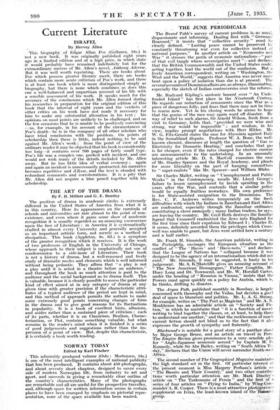THE JUNE PERIODICALS - The Round Table's survey of current
problems is, as usual, dispassionate and informing. Dealing first with " Germany Rearmed," it insists that " collective security " must be clearly defined. " Lasting peace cannot be preserved by constantly threatening war even for collective instead of national purposes." In another article on " Economics and War " it stresses the perils of economic nationalism—" part . of that evil tangle where sovereignties meet "—and declares that the British Commonwealth and the United States could, acting together, lead the world out of the confusion. But a lively American correspondent, writing on " Washington, the West and the World," suggests that America was never more bent upon a policy of isolation than she is at present. The several accounts of Dominion affairs are, as always, illuminating, especially the sketch of Indian controversies over the reforms.
Mr. Rudyard Kipling's sardonic lament over " An Unde- fended Island" has first place in the Nineteenth Century. He regards our reduction of armaments since the War as a piece of dangerous folly, and fears that there may not be tithe to rearm now. Yet in his closing words he seems to hope that the genius of the race may again ward off disaster. By way of relief to such alarms, Sir Arnold Wilson, fresh from a visit to Germany, holds that, "provided we were wise and strong, war would be impossible " ; and wisdom, hi his view, implies prompt negotiations with Herr Hitler. Mr. W. G. Fitz-Gerald states the case for Abyssinia against Italy in the Somaliland dispute. Professor W. A. Bone, the well- known chemist, discusses' at length the question of "Gas or Electricity for Domestic Heating,?' and concludes that gas is far cheaper, even if the rates charged for electric current are unremunerative to the undertaking. In an unusually interesting article Mr. D. S. MacColl examines the case of Mr. Stanley Spencer and the Royal Academy, and pleads for more liberality on the part of hanging committees to " super-realists " like -Mr. Spencer—and William Blake.
Sir Charles Mallet, writing on "Unemployment and Public Works" in the Contemporary, recalls Mr. Lloyd George's failure to lessen unemployment by lavish spending in the years after the War, and contends that a similar policy would be equally fruitless nowadays. His own preference is for State-assisted emigration to. the Dominions. The Rev. C. F. Andrews writes temperately on the fresh difficulties with which the Indians in Zanzibazand East Africa are confronted, especially through the Zanzibar ordinance constituting a clove monopoly ; many Indian traders, he says, are leaving the country. Mr. Cecil Roth destroys the familiar legend that Cromwell readmitted the Jews into England for the first time since their expulsion by Edward I; Charles II, it seems, definitely accorded them the privileges which Crom- well was unable to grant, but Jews were settled here a century and a half earlier.
Mr. Frank H. Simonds, the American publicist, writing in the Fortnightly, envisages the European situation as the conflict of The ' Haves ' and ' Have-nots,' " and declares that the League of Nations has "collapsed because it was . designed to be the agency of an internationalism which did not exist.' Mr. Simonds, it may be suggested, is hasty in his judgement. Mr. S. K.IRatcliffe gives an amusing account of "The New American Demagogues," Father Coughlin, Mr. Huey Long and Dr: Townsend, and Mr. W. Horsfall Carter, " under the heading of "Reunion in Vienna," insists that the Powers must agree quickly on a policy for Austria, which is, he thinks, drifting to disaster.
The Aryan Path, published monthly. in Bombay, is largely ' concerned- with theosophy and the Vedas, but devotes a good deal of space to literature and politics. Mr. L. A. G. Strong, for example,. writes on ". The Poet as Magician" and Mr. A. N. MOnkhbuse has an. admirable article on "Society- and Fic- tion," in which he maintains that "it is a function of novel- writing to bind together the Classes, or, at least, to help thera to understand one another," and that the recklessness of much current fiction should not blind us to the fact that it alsu expresSes the growth of sympathy and fraternity.
Blackwood's is notable for a good story of a panther shoot by Major George Bruce, and an article on travel inPeru. The Etnpire Review gives-prominence to a very- sensible plea for " Anglo-Japanese economic accord" by Captain M. D. Kennedy, while Sir Abe Bailey, writing on "South Africa To -declares that the Union will never surrender .South-west
Africa. ". -
,. The second number of The Geographical Magazine maintains the high standard set in the first. Of particular interest at the present moment is Miss Margery Perham's 'Article on The Elasuto and Their Countiri, and two otheiriOntribu- tions- -Worth particular attention are Mr. Mark Dineley's article on "The Turkomans of Persia" and the firiit Of a , series of four articles on Flying to India," by Wing Con marider A. R. Cooper There is most attractive plintogrevunt
• supplement on Iviza, the least-known island of the Isailearh; ,group. .










































 Previous page
Previous page